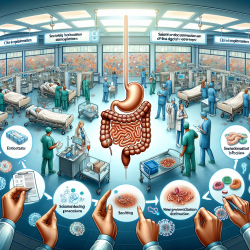The critical care environment is a complex and challenging setting where hospital-acquired infections (HAIs) pose significant risks to patient outcomes. The SuDDICU study, titled "A study of the perceived risks, benefits and barriers to the use of SDD in adult critical care units," provides valuable insights into an intervention known as Selective Decontamination of the Digestive Tract (SDD). This research offers practitioners a pathway to improve their skills and patient outcomes by understanding and potentially implementing SDD in their practice.
The Importance of SDD
SDD involves applying topical non-absorbable antibiotics to the oropharynx and stomach, along with a short course of intravenous antibiotics. This intervention has shown promise in reducing pneumonia rates and mortality among ICU patients. Despite its potential benefits, SDD has not been widely adopted across ICUs due to various perceived risks and barriers.
Key Findings from the SuDDICU Study
- Evidence Base: The study highlights that while there is a strong evidence base supporting SDD's effectiveness in reducing infections, concerns about antibiotic resistance and external validity remain significant barriers.
- Stakeholder Beliefs: Through a Delphi study approach, the research identifies diverse beliefs among stakeholders regarding the benefits and risks associated with SDD implementation.
- Implementation Challenges: The study outlines practical challenges in implementing SDD, including resource allocation and clinician resistance due to counterintuitive aspects of the intervention.
Improving Practitioner Skills
The SuDDICU study provides a framework for practitioners to enhance their skills by engaging with its findings. Here are some ways practitioners can benefit:
- Diversify Knowledge: By understanding the comprehensive evidence base for SDD, practitioners can make informed decisions about its applicability in their specific healthcare settings.
- Cultivate Collaboration: Engaging with multidisciplinary teams can help address concerns about antibiotic resistance and facilitate smoother implementation of SDD protocols.
- Pursue Further Research: Practitioners are encouraged to participate in or initiate further research to explore SDD's effectiveness across different healthcare environments.
The Path Forward
The SuDDICU study emphasizes that before full-scale implementation of SDD can occur, further high-quality evidence demonstrating clinical effectiveness across various healthcare systems is necessary. Practitioners can play a pivotal role by contributing to this evidence base through research collaboration and clinical trials.










